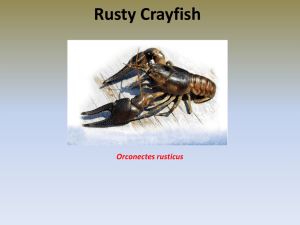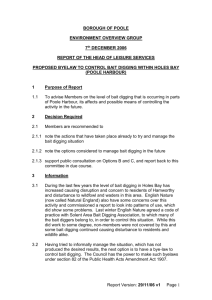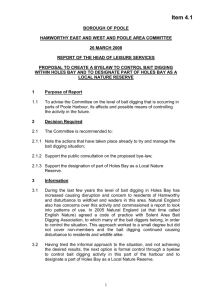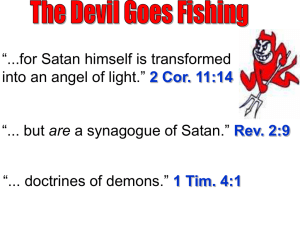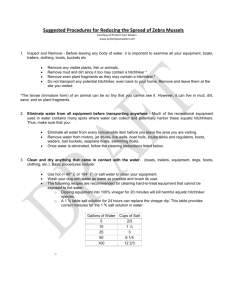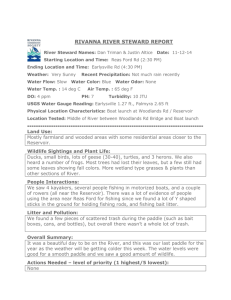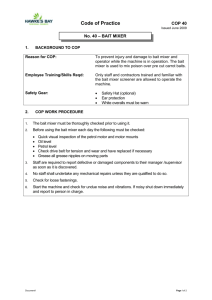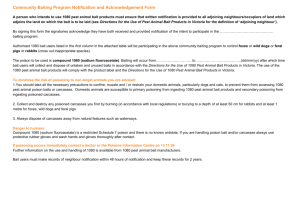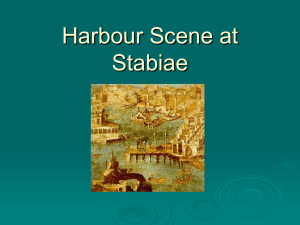(Attachment: 4)Bait Digging Briefing Note
advertisement
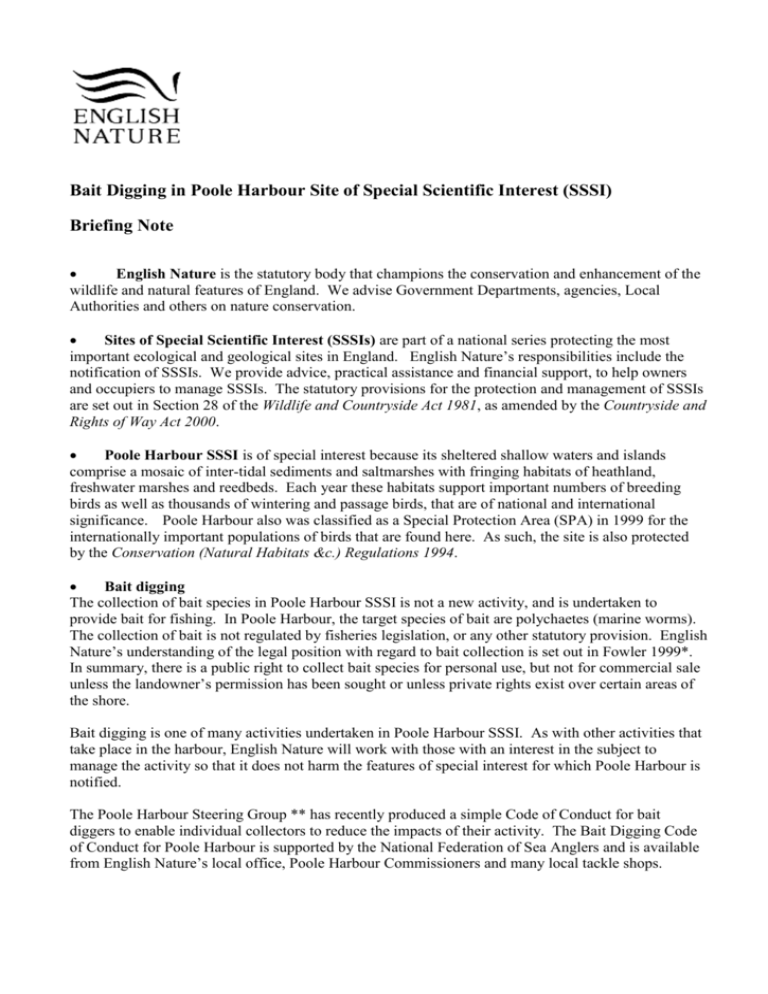
Bait Digging in Poole Harbour Site of Special Scientific Interest (SSSI) Briefing Note English Nature is the statutory body that champions the conservation and enhancement of the wildlife and natural features of England. We advise Government Departments, agencies, Local Authorities and others on nature conservation. Sites of Special Scientific Interest (SSSIs) are part of a national series protecting the most important ecological and geological sites in England. English Nature’s responsibilities include the notification of SSSIs. We provide advice, practical assistance and financial support, to help owners and occupiers to manage SSSIs. The statutory provisions for the protection and management of SSSIs are set out in Section 28 of the Wildlife and Countryside Act 1981, as amended by the Countryside and Rights of Way Act 2000. Poole Harbour SSSI is of special interest because its sheltered shallow waters and islands comprise a mosaic of inter-tidal sediments and saltmarshes with fringing habitats of heathland, freshwater marshes and reedbeds. Each year these habitats support important numbers of breeding birds as well as thousands of wintering and passage birds, that are of national and international significance. Poole Harbour also was classified as a Special Protection Area (SPA) in 1999 for the internationally important populations of birds that are found here. As such, the site is also protected by the Conservation (Natural Habitats &c.) Regulations 1994. Bait digging The collection of bait species in Poole Harbour SSSI is not a new activity, and is undertaken to provide bait for fishing. In Poole Harbour, the target species of bait are polychaetes (marine worms). The collection of bait is not regulated by fisheries legislation, or any other statutory provision. English Nature’s understanding of the legal position with regard to bait collection is set out in Fowler 1999*. In summary, there is a public right to collect bait species for personal use, but not for commercial sale unless the landowner’s permission has been sought or unless private rights exist over certain areas of the shore. Bait digging is one of many activities undertaken in Poole Harbour SSSI. As with other activities that take place in the harbour, English Nature will work with those with an interest in the subject to manage the activity so that it does not harm the features of special interest for which Poole Harbour is notified. The Poole Harbour Steering Group ** has recently produced a simple Code of Conduct for bait diggers to enable individual collectors to reduce the impacts of their activity. The Bait Digging Code of Conduct for Poole Harbour is supported by the National Federation of Sea Anglers and is available from English Nature’s local office, Poole Harbour Commissioners and many local tackle shops. Bait Digging in Holes Bay We are aware that there have been concerns expressed by local residents regarding bait digging activity in Holes Bay. Bait Digging is undertaken in Holes Bay mainly by members of the Solent Area Bait Digging Association (SABDA). The target species in Holes Bay is King Ragworm Nereis virens From a nature conservation perspective, it is not a priority for English Nature to focus on whether the collection of bait species is for private use or commercial sale. Our focus will be to assess whether bait digging activities are being undertaken in a way that does not affect the special interest features of the SSSI We are engaged in discussions with representatives of the bait diggers, landowners and other English Nature Teams in order to understand the levels of bait digging activity, the methods by which the bait is taken, including the seasonal nature of the activity, and to explore ways in which the activity can be managed. We will continue to liaise with the above parties to work towards an acceptable solution in Poole Harbour. Managing bait digging activity Our priorities in the short term are to investigate the impacts of bait digging on the nature conservation interest of Poole Harbour SSSI. We will continue to work with SABDA to agree spatial restrictions on bait digging activity as well as detailed methods of working to minimise any potential disturbance to birds in the winter months. The discussions we have held with SABDA to date have been positive, and it is clear that SABDA wish to co-operate with English Nature to manage their activity. To achieve the sustainable management of bait digging activity in Poole Harbour, English Nature will: 1. 2. 3. 4. Promote the responsible approach outlined in the Poole Harbour Bait Digging Code of Conduct Advise on measures that should be taken by bait diggers to limit disturbance to birds Recognise that most bait collectors wish to collect bait responsibly Continue to work with land owners, bait diggers, local authorities and all those with an interest in the collection of bait for angling, to improve the management of the activity 5. Work towards understanding the actual, as opposed to perceived, impacts of bait digging activity 6. Seek to establish a sufficient network of winter refuge areas for birds throughout the Harbour as part of an overall strategy for Poole Harbour SSSI. We will continue to review our position in light of all new environmental information that may come to light. English Nature Dorset Team 14 April 2005 *Fowler, SL (1999) Guidelines for managing the collection of bait and other shoreline animals within UK European Marine Sites. English Nature (UK Marine SACs Project). **Membership of the Steering Group includes English Nature, Poole Harbour Commissioners, Poole Borough Council, Purbeck District Council, Dorset County Council, Southern Sea Fisheries District Committee, the Environment Agency and Wessex Water.
